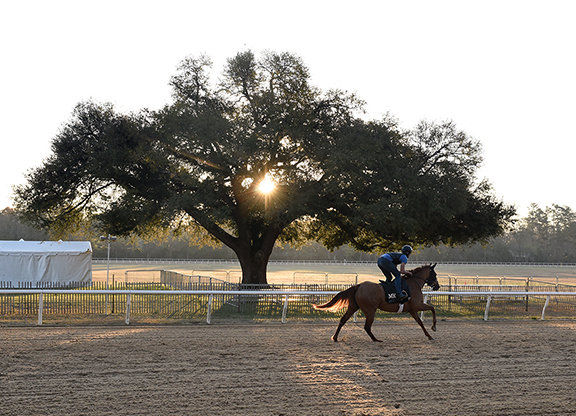Historic Aiken Training Center Battles to Restore Past Glory

Morning at the Aiken Training Center | Sarah Andrew
By Bill Finley
For one weekend, it seemed like the good old days for the Aiken, South Carolina Training Center. In fewer than 24 hours, starting with the July 5 evening card at Prairie Meadows, horses that had trained at Aiken won the GIII Cornhusker H., the GI Belmont Oaks Invitational, the GI Belmont Derby Invitational and the GIII Kent S.
For a training center whose horse population now peaks at about 110, it was a tremendous accomplishment. But such a run of success was not unusual. That is if you take a trip back in time.
There was a period when Aiken was the winter home of some of the top trainers and owners in the country, many of them the so called “society stables” that were such a force in New York in the 1950s, 60s, 70s and 80s. Rokeby Stable, Greentree, the Phipps Family, King Ranch, C.V. Whitney and Claiborne Farm were among the owners who had stalls at Aiken. So, too, did trainers like Woody Stephens, Mack Miler, John Gaver and Mike Freeman.
Aiken opened in 1941.
“It was a private club for a long time and really there was no initiative for Aiken to step up and bring new people in,” said Cary Frommer, a consignor who also breaks and trains horses at Aiken. “They were quite happy to have their private little paradise to train in.”
But times change in racing and Frommer admits that Aiken failed to adjust. The role of private trainer for a wealthy owner-breeder largely disappeared and the training center found itself hard-pressed to replace the outfits that began to disappear from racing.
In the meantime, Ocala became the place of choice for many horsemen who were either getting horses ready for the sales, breaking them in preparation for their 2-year-old seasons or laying up horses that needed rest. That Ocala is closer to Gulfstream and stabling facilities like Palm Meadows and Palm Beach Downs than Aiken is, gives it an advantage over the South Carolina facility.
According to Frommer, Aiken once had the capacity to house 350 horses. That changed when several barns were turned over to people who were training non-race horse and focusing on other equestrian pursuits. Aiken now has room for 200 Thoroughbreds, but Frommer said the population dipped to about 110 during the winter and early spring months. With the recent death of owner Gustav Schickedanz, Aiken’s population could be even lower next year as he had one of the larger stables at the facility with 25 horses.
“We’re not going to close any time soon, but it’s certainly not where it once was,” Frommer said.
Yet, Frommer says that an invigorated Aiken management team is determined to see to it that not only will the training center survive but that it will begin to grow again. A new Chairman of the Board, Chad Ingram, has been brought in and he is spearheading the effort to get the word out the Aiken has assets that can’t be found at any other training center in the country.
“The situation isn’t that bad,” Ingram said. “We have a wonderful track. We’re not about to close the doors. That’s not the case at all. We’ve got some new board members who are putting a lot of effort and energy into bringing the training track back to a thriving status.”
Frommer said she believed they were now doing a better job of getting the word out about all that Aiken has to offer. That four Aiken graduates, including GI winners Concrete Rose (Twirling Candy) and Henley’s Joy (Kitten’s Joy), won graded stakes earlier in the month is part of a story Frommer and others are trying to get out. Frommer says that based on her experience, horses thrive in the type of climate Aiken has. During the winter and spring, it is never too hot or cold and there is a change of seasons. The same can’t be said for Florida.
“I think horses need to have a change of season,” she said. “It’s good for them. They need to grow a little coat, they need to do all the natural things that they’re supposed to do. Florida is a great place, but that just doesn’t happen there. I think this is all an important part of a horse developing and growing.”
She lists Aiken’s other major asset as the town itself.
“I think we should reach out to young trainers who have a family and want a life and want to settle in rather than moving around all the time,” she said. “This is a really great town for a family and place for people to raise kids. The thing about Aiken, when somebody comes here they love it. It’s just getting them here.”
Ingram says that the annual Aiken Trials, held each year in mid-March, bring in a substantial amount of revenue, which has helped keep the training center afloat. But he wants something better for Aiken. He wants it to once again be a major training center with stalls filled with horses that will flourish when they make it to the races.
“I think we have the best possible climate to train in the country in the wintertime,” he said. “We think the surface of the track is as good as any track in Southeast. We think we’re a hidden gem. We just need more people to understand all that we have to offer.”

 follow us on
follow us on